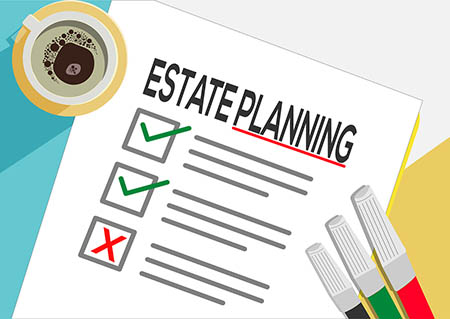As painful as it can be to discuss your eventual passing, forethought and proper planning will ensure that your assets pass efficiently to your designated heirs. Making the job of your executor of estate less complicated and avoiding a complex probate process is best assured if you, the testator, leave clear and unambiguous information and instructions.
Your executor of estate has several responsibilities to manage at the time of your death. Besides securing your home, advising relatives and others, and ordering death certificates, the individual is responsible for gathering all documents pertaining to your life including deeds, titles, insurance policies, marriage license, divorce decrees, bank accounts, Social Security, and more.
Having no knowledge of the location of your documents, confusion and uncertainty can occur, particularly with an unexpected or accidental death. Uncovering and determining the extent of your estate can be a lengthy process, and the eventual disbursement of assets may not be according to your wishes.
Instead, carefully prepare the designated executor of your estate in the event of an unexpected passing. Begin by identifying the location of all essential documents and value of your assets that comprise your estate.
Get Organized
Do not procrastinate. As soon as possible, create a checklist of essential elements to discuss with your designated executor of estate. And, always remember to update values regularly and report changes to the locations of key documents.
Your checklist should include the following seven elements:
1. Create a Roadmap
To avoid causing the executor of your estate to struggle to reconstruct your financial life following your death, create a roadmap that lists precisely where to find every document, contract, or deed plus all bank and brokerage accounts that you have. Keep the roadmap current as elements change.
2. Designate the Location of the Original Will
The principal document that determines how your assets are to be distributed is your will. The executor of your estate should have access upon your passing to determine how remaining assets minus liabilities should be divided among your heirs. Personal items that you may wish to leave to certain individuals should be clearly specified.
Your will and other important documents should always be in a safe place within your home or in a safety deposit box that your executor will be able to access.
3. Bank Account Information
List all bank, savings, and credit card accounts with account numbers and contact information in order that your executor of the estate can take appropriate action. Ensure that all accounts are identified. Keep this information updated as changes occur. If the account is not co-owned, identifying a payable-on-death beneficiary, possibly your executor, will simplify the liquidation of the bank accounts.
4. Brokerage and Investment Information
If you have investments in stocks, bonds, IRAs, certificates of deposit, or other assets, make a list of the brokerages and financial institutions plus account numbers. If you work directly with a specific stockbroker or banker, make sure your executor is given contact information.
The location of any savings bonds should be clearly identified.
5. Summary Valuation of All Assets
Create a personal Balance Sheet and update it at least once per year. Whether your record all assets and liabilities on a software program like Quicken or record them manually on a spreadsheet, list your assets and liabilities and advise the executor of the estate of the location and access information.
Accurate valuation and accounting of your net worth provide your executor with a clear understanding of where and how much your estate is worth once liabilities are paid off or transferred.
Update the valuation of your assets and liabilities frequently, especially as notable changes occur.
6. Location of Deeds
Property ownership is a key element of most people’s estate. Make sure the deeds or titles of ownership to all property are easily accessible so that they may be transferred or sold without complications.
7. Life Insurance Policies
Life insurance policies, whether term or whole life, can be a substantial part of your estate. Make sure the executor can access all policies and can contact the agency or insurance company with an official death certificate to begin the insurance payment process.
Estate Preparation is Important
Even though you may be likely to live for many years more, accidents or sudden illnesses do occur. Having a well-prepared will, gathering important information, and identifying a trusting executor of your estate will provide peace of mind that your assets will be distributed according to your wishes.
Work with an attorney who specializes in estate planning and probate law to make the process easier to understand. Obtaining professional advice to help with your will, designate your executor, and define your wishes is an important first step.
About Giuditta Law
Nick Giuditta provides sound advice for a variety of estate planning issues, including wills, trusts, durable powers of attorney, probate, and estate administration and other elder law matters.
You can reach Nick by phone at 908.232.0099 or via e-mail to schedule an appointment. Nick replies to all phone calls and e-mails promptly, usually within the same day.
 Experienced Wills and Estates Lawyer helping clients create estate plans
Experienced Wills and Estates Lawyer helping clients create estate plans 